There’s a conventional wisdom forming that in releasing the detained Chinese trawler captain, Japan backed down to Chinese pressure and as a result “lost” the confrontation. This is probably true from a short-term perspective, but the proof of the pudding will be whether Japan, in future, concedes on both the issue at hand — sovereignty over the disputed islands — and the broader issue that is China’s reach for regional dominance. I don’t think either of those are likely. And I think John McCreary sums up nicely why that is: The Chinese have overreached in their dealings with Japan, Southeast […]
China Archive
Free Newsletter
During Russian President Dmitry Medvedev’s three-day visit to China, the two countries announced the opening of a pipeline that will triple the supply of Russian oil flowing China beginning next year, and they touted closer regional security cooperation. They also extended the terms of an agreement for supplying Russian natural gas to China, but failed to agree on a price for the gas.
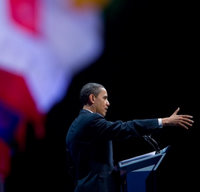
On Sept. 12, after months of negotiations, the Basel Committee on Banking Supervision, a historically low-profile international institution, announced that its participants had agreed to new international minimum capital standards for banks. Scheduled to be phased in carefully over the next eight years, the new agreement — informally referred to as Basel III — represents the most significant set of international financial regulations to emerge since the onset of the global financial crisis. Yet, to succeed, Basel III depends entirely on national governments voluntarily following through on implementing and maintaining the new standards. As a result, distributional consequences across countries […]

According to virtually all global warming projections, humanity faces significantly more conflict in the decades ahead as we fight over dwindling resources in climate-stressed lands. However, those reports typically overlook one likely outcome that could counterbalance the more negative impacts of global warming — that of northern territories becoming significantly milder, more accessible, and, most intriguingly, more hospitable to immigration. This is the essential good news to be found in Laurence C. Smith’s fascinating new book, “The World in 2050.” The ambitious title is perhaps a bit misleading, for where Smith really delivers is on the subtitle: “Four Forces Shaping […]
It seems like only last year that we were hearing warnings about how the state-capitalist model made possible by power concentrated at the top in places like China and Russia would ultimately make liberal economies a quaint artifact of the past. Now, it seems, China is increasingly going from mono to surround sound, as a marketplace of ideas emerges in its highest decision-making levels, at least when it comes to foreign policy and national security. It’s hard to imagine that this sort of policy-jockeying won’t also begin to characterize domestic economic policy, especially as the need to develop the vast […]
From Judy Dempsey, describing China’s increasing reach in Eastern Europe: From the Baltic states to the Balkans, Chinese companies, flush with money, are buying real estate and competing for public infrastructure contracts, especially as Poland and Ukraine work at breakneck speed to jointly play host to the 2012 European soccer championship. I’d already seen some suggestion that Brazil was also turning to China for expertise and support in advance of hosting the World Cup in 2014 and Olympics in 2016. The 2008 Beijing Olympics were seen at the time through the prism of soft power — China’s coming out party. […]
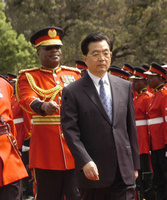
When Europe ran the world, trade followed the flag, meaning that globalization in its initial expression — otherwise known as colonialism — grew out of the barrel of a gun, to paraphrase Mao Zedong. On this subject, Franklin Roosevelt and Vladimir Lenin agreed, even if that conclusion led them to embrace diametrically opposed strategies: FDR’s realization that “the colonial system means war” drove him to erect an international liberal trade order following World War II that doomed the vast colonial systems of his closest European allies. Roosevelt’s success not only enabled America to contain and ultimately defeat the soul-crushing Soviet […]
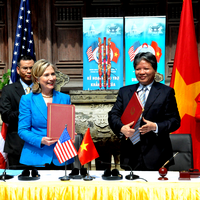
Nuclear energy’s recent renaissance has seen the United States firm up nuclear cooperation agreements with a number of emerging nuclear nations. However the most eye-catching so far is the proposed deal with Vietnam, which stands out not only for its departure from the standard template of such deals, as epitomized by the U.S.-UAE nuclear agreement, but also because it comes at a time when Sino-American interests have been at odds in the South China Sea. More broadly, the deal reflects the unfolding American strategy to counter Chinese assertiveness in the Asia-Pacific region. Nonproliferation hawks are up in arms that the […]
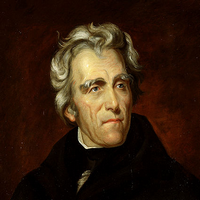
A great deal of ink has been spilled on the domestic trajectory of the “Tea Party” movement, which is demonstrating its growing clout within the ranks of the Republican party and could end up playing a decisive factor in the 2010 midterm congressional elections. But less attention has been given to the foreign policy implications of the Tea Party’s possible ascendancy. Even if the Republicans take back control of both houses of Congress this fall, the Tea Party is unlikely to play a major role in shaping U.S. foreign policy. However, its perspective will shape popular perception, and its counsel […]

With little more than 50 days left until elections on Nov. 7, tensions are rising noticeably in Burma — the country renamed Myanmar by its military rulers. The junta that keeps the country in its steely grip is trying to make sure the election goes off exactly as planned — which is to say, without triggering a new revolt, let alone a full-fledged revolution, and without producing an electoral outcome that would embarrass the regime or weaken its hold on power. The regime is so nervous that it recently ordered the temporary suspension of the magazine Modern Times as punishment […]
I just wanted to flag two thought-provoking articles on the strategic shifts associated with China’s rise, which I’ve taken to calling, “The Great Asia Rebalancing.” The first is by Hugh White (excerpted from a longer essay here), the second by Michael Clarke. Together, they offer fascinating insights into the strategic choices faced by two historic U.S. allies, both of whom face very real constraints on their ability to keep up with the dramatic changes shaping the global security environment. Clarke notes that with the end of any real security threat either originating from or menacing Europe, the U.S. has effectively […]
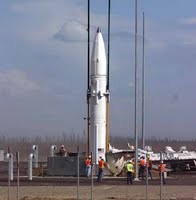
Critics of the New START treaty charge that, if ratified, it would constrain U.S. missile defense plans. Whether or not the treaty’s non-binding preamble supports their argument, the broader question regarding the future of missile defense is an important one. Missile defenses bolster deterrence and strengthen the security of U.S. allies, giving them a significant role to play in a fluid and dynamic contemporary security environment. But regardless of the New START treaty, the Obama administration will have to limit U.S. missile defense plans if it wishes to remain credibly committed to future arms reduction agreements with Russia, as well […]

In June of this year, the United States Navy published the 2010 Naval Operations Concept (.pdf) (NOC), designed as the operational fulfillment of the Cooperative Maritime Strategy (.pdf) (CS-21) released in 2007. The 112-page NOC is an elaboration of the concepts set forth in the 20-page Cooperative Strategy, with detailed discussion of how the missions laid forth in the earlier document can be accomplished with the forces available to the United States Navy. CS-21 itself is a curious document. Deceptively modest, it was developed as the Navy’s strategic answer to the post-Cold War environment. But whether intentionally, as some have […]
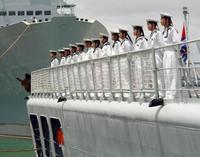
China’s remarkable weathering of the global recession has accelerated the expansion of its power relative to that of the West. American observers of China have already noted an increasingly assertive approach by Beijing, and attribute this shift in behavior to an expectation among China’s leaders of a greater degree of deference and influence in international affairs. Nowhere is this dynamic more apparent than in regional maritime issues, where Beijing’s interests in maintaining access to foreign resources and enforcing its claims of sovereignty mix with foreign perceptions of Chinese intentions and external reactions to China’s decades-long military modernization program. Fueled by […]
Singapore and Taiwan may sign a free trade agreement, according to officials from both countries. In an e-mail interview, Sheridan Prasso, an Asia Society associate fellow, discusses the evolution of Taiwan’s trade policy. WPR: What has historically been Taiwan’s trade policy? Sheridan Prasso: For decades, Taiwan was able to sustain a high rate of growth by using its low-wage workforce to turn out consumer goods such as shoes and apparel, and electrical products such as clocks and calculators. Much of this was exported to markets in North America and Europe. “Made in Taiwan” was as ubiquitous in the 1960s-1980s as […]
I got an e-mail a while back from a reader who mentioned that he loved our Global Insider items, adding that they’re always highly informative even if the subjects are a bit “random.” I agreed with the former observation, but not with the latter. And a news item that I expect will garner a bit of attention over the coming days will help explain the method behind the apparent madness. We usually pick the GI topics from items on our Leading Indicators channel, based on whether we feel like it warrants closer attention due to its significance or its likelihood […]
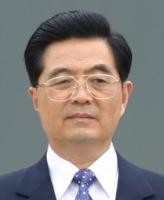
Indian Defense Minister A.K. Anthony visited South Korea last week at the invitation of his South Korean counterpart to boost defense cooperation between the two states. His visit came just two months after the Indian external affairs minister visited Seoul and at a time of great turbulence in the strategic environment of the Asia-Pacific region. After having long ignored each other, India and South Korea are now beginning to recognize the importance of tighter ties. The resulting courtship was highlighted by South Korean President Lee Myung-Bak’s state visit to New Delhi in January, when he was the chief guest at […]
